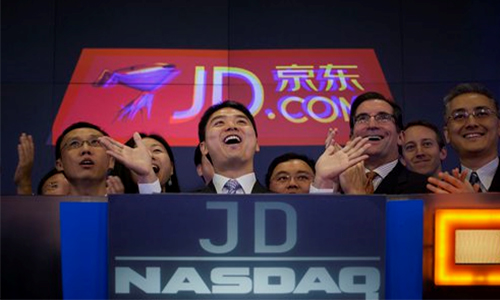JD.com heads for Hong Kong listing
By Xie Jun and Li Qiaoyi Source:Global Times Published: 2020/6/8 21:03:40
Secondary IPO will diversify bourse, more mainland firms to follow

Richard Liu Qiangdong (center), founder of JD.com Inc, applauds during an IPO ceremony at the NASDAQ MarketSite in New York on May 22, 2014. File photo: VCG
It's just days before China's e-commerce giant JD.com gets a listing on the Hong Kong bourse, the second mega IPO of a Chinese mainland-based technology powerhouse following Alibaba's secondary listing in Hong Kong last November.
The JD.com listing is reportedly oversubscribed multiple times, and experts said it will be a bellwether for more mainland technology companies seeking IPOs in Hong Kong.
The local stock exchange and financial authorities expressly applaud more listings in the city that is considered to stay alluring for global investors.
"All companies that meet our listing requirements are very welcome in Hong Kong - our framework is backed by the rule of law and a deep and experienced professional community," a spokesperson for Hong Kong Exchanges and Clearing (HKEX), the local bourse operator, told the Global Times on Monday.
HKEX introduced major reforms to the city's listing regime in April 2018, welcoming new economy companies to HKEX. Since the listing reform, 84 new economy companies have listed in Hong Kong as of April 2020, raising a total of HK$302.3 billion ($39.01 billion) and accounting for 50.8 percent of IPO funds raised in the city during the period.
A spokesman for the city's Financial Services and Treasury Bureau also told the Global Times that it welcomes "all enterprises that could meet regulatory requirements to list in Hong Kong."
"We believe that Hong Kong is well-positioned to attract overseas companies to list in Hong Kong," the spokesman said, adding that Hong Kong has a highly open and internationalized market, a regulatory regime aligned with major overseas markets, a rich pool of professional talent and robust infrastructure support, all of which allow Hong Kong to become an attractive platform for listings.
On Monday, JD.com launched its secondary offering in Hong Kong, with a maximum price of HK$236 HK ($30.44) per share.
As one of Alibaba's biggest rivals in China, JD.com plans to offer 133 million new shares, of which about 5 percent are for investors in Hong Kong. Subscriptions began on Monday and close on Thursday.
JD.com already passed a hearing by the listing committee of the Hong Kong stock exchange and filed to list its shares on the bourse for trading on June 18, which is another online shopping gala, apart from the Double 11 online event. JD.com is now listed in the US.
According to a document Bank of China (Hong Kong) sent to the Global Times, the bank will scrap service fees for clients who purchase JD.com shares during the subscription period. The bank didn't reveal the subscription status.
However, based on a report by Bloomberg, JD.com's Hong Kong share sale has been oversubscribed "multiple times" by institutional investors.
This seems another proof of investors' passion for trading stocks of mainland technology juggernauts that seek secondary listings in Hong Kong. Last year, Alibaba's Hong Kong IPO was 42.4 times oversubscribed for retail investors when the tech giant went public in November, according to media reports.
An investment banking analyst with a Chinese joint-stock bank told the Global Times that JD.com's new share price is attractive and market enthusiasm for China's No.2 e-commerce website is understandable, considering it's a "very rare and qualified" investment target.
Liu Guohong, director of the Department of Finance and Modern Industries at the China Development Institute, said that such mega IPOs as those of Alibaba and JD.com show that more mainland-based technology enterprises will choose to list in Hong Kong.
These IPOs will act as stabilizers to Hong Kong's capital market amid social instability, including US pressure concerning China's proposed new national security law for Hong Kong.
"The 'meeting' of several mainland juggernauts on the Hong Kong stock market not only reflects the appeal and status of the Hong Kong market but will also drive inflows of more international capital and attract more attention from global investors," Liu told the Global Times.
The stock-exchange operator is constantly exploring measures to enhance the global competitiveness and attractiveness of its IPO market, the HKEX spokesperson said.
"We have a strong IPO pipeline. We are in the top five stock exchanges for funds raised so far this year, and have been No. 1 In seven of the last 11 years."
The investment banking analyst also said that Hong Kong's quick rebound from a sharp decline upon news of the security law showed that the Chinese market is still the most qualified asset harbor in the world.
JD.com's secondary listing in Hong Kong is also seen by many as a kind of "homecoming" by mainland companies that are listed in the US. China-US financial tensions have flared recently, and the US has taken action to tighten regulation of mainland companies listed there.
Liang Haiming, chairman of the China Silk Road iValley Research Institute and a Hong Kong-based economist, said that many mainland companies will want to copy the successful experience of Alibaba, whose secondary IPO resulted in more than 4 billion yuan in average daily trading volume in Hong Kong, a big boost to its financing.
According to Liang, the shift of overseas-listed companies to Hong Kong will enhance the exchange's turnover and increase tax revenues.
More important, the trend will bring structural changes to the Hong Kong market by introducing new economy stocks to the exchange, which has traditionally focused on real economy sectors like finance and real estate.
RELATED ARTICLES:
Posted in: COMPANIES